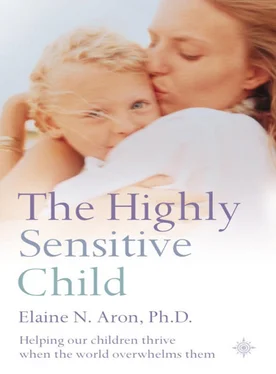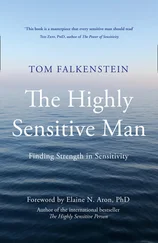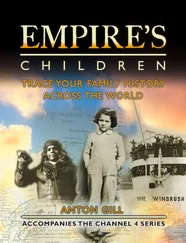For example, when a child is just watching, we tend to say she is shy or fearful without considering the possibility that this may be the expression of a sensitive individual’s innate preference to pause and observe before proceeding. Or we may hear that a child is “overreacting” or “cannot screen out irrelevant information” when he notices every mood and detail. But what is wrong with having a nervous system that is extremely good at registering the subtle nuances in a given situation? (Besides, who can say what is irrelevant? Noticing where the exit is might seem to most people like seeing “too many details”—until there’s a fire.)
Probably one reason I had this insight about renaming the trait was that, being highly sensitive myself, I knew a little better what was going on inside a sensitive person. True, we are a bit more likely to become shy or anxious after being exposed to certain adverse circumstances. But I am now convinced that it is sensitivity, not shyness or anxiety, that is the fundamental trait. Furthermore, both my research and the research of others indicate that it is primarily parenting that decides whether the expression of sensitivity will be an advantage or a source of anxiety. There are simply too many highly sensitive individuals—again, about 20 percent of the population—for this trait to be a consistent disadvantage. Evolution would not have permitted it. When we understand this trait as sensitivity, we can see its many assets, notice the many sensitive individuals who are thriving, speak of the trait accurately, and above all, parent sensitive children better.
Describing this trait as high sensitivity has been justified best, however, by the response to the concept from the hundreds of thousands who read The Highly Sensitive Person or The Highly Sensitive Person in Love , many of whom have told me, “That’s me—it fits me perfectly, and I never knew anyone else had these feelings … this hunger for enough down time and quiet, the almost constant awareness of others and concern for doing things right.” (This response has not been trivial. My first book, The Highly Sensitive Person , became a best-seller and has been translated into Dutch, Japanese, Chinese, Greek, and Polish so far.) Many who contacted me also went on to say that they wished their parents had known about this trait when raising them, or they wanted advice on how to raise their own sensitive child.
Thus it seemed important to write The Highly Sensitive Child , particularly because the advice in the many generally good, one-size-fits-all parenting books leaves out issues that are important for HSCs, such as the need to maintain an optimal level of stimulation and how to do that. Missing just this point about arousal can lead to real problems, such as when a book suggests discipline methods that would so overarouse HSCs that they would be too upset to take in the moral lesson behind the correction. There is simply no other parenting book written with HSCs in mind.
Above all, this book was written because I know some of you are having considerable trouble raising an HSC. This should not be happening. Some of you may have even concluded that there is something wrong with your child or with you as a parent. This book will help alleviate that feeling. It really will. You will relax about your child and your child will be able to relax as well.
I strongly urge you to read the whole book. The first half is about sensitivity, how your parenting is affected by your own temperament, and the biggest issues to be faced with HSCs, regardless of the age of your child. The second half focuses on specific age groups, all the way from infancy to the young adult who has left home. You should read about all ages of HSCs because (1) there are fresh ideas in each chapter that also apply to children of other ages; (2) under stress, HSCs can return to the behaviors and problems of a younger age, and when feeling good HSCs can act older than their age, so the advice for an age that your child is not may still apply right now; and (3) understanding what was happening during the years before you read this book and what will happen in the years ahead can help you a great deal with your child today.
The “Applying What You Have Learned” sections at the end of some chapters are, of course, optional, but should be helpful and enjoyable. And the case studies provided are all of real parents and children, with the names and identifying details changed, of course.
Above all, I hope that you use this book with pleasure. Having an HSC is a great blessing. Yes, there are some complications because your child is “different,” but here is this book’s motto (it was mine even before I understood that my son was an HSC): To have an exceptional child you must be willing to have an exceptional child . You have one. And this book will teach you how to raise him to be not only exceptional, but healthy, loving, well-adjusted, and happy.
Is Your Child Highly Sensitive? A Parent’s Questionnaire
Please answer each question as best you can. Answer TRUE if it is true or at least moderately true of your child, or was for a substantial time in the past. Answer FALSE if it has not been very true of your child, or was never true.
My child …
| 1. |
T |
F |
startles easily. |
| 2. |
T |
F |
complains about scratchy clothing, seams in socks, or labels against his/her skin. |
| 3. |
T |
F |
doesn’t usually enjoy big surprises. |
| 4. |
T |
F |
learns better from a gentle correction than strong punishment. |
| 5. |
T |
F |
seems to read my mind. |
| 6. |
T |
F |
uses big words for his/her age. |
| 7. |
T |
F |
notices the slightest unusual odor. |
| 8. |
T |
F |
has a clever sense of humor. |
| 9. |
T |
F |
seems very intuitive. |
| 10. |
T |
F |
is hard to get to sleep after an exciting day. |
| 11. |
T |
F |
doesn’t do well with big changes. |
| 12. |
T |
F |
wants to change clothes if wet or sandy. |
| 13. |
T |
F |
asks lots of questions. |
| 14. |
T |
F |
is a perfectionist. |
| 15. |
T |
F |
notices the distress of others. |
| 16. |
T |
F |
prefers quiet play. |
| 17. |
T |
F |
asks deep, thought-provoking questions. |
| 18. |
T |
F |
is very sensitive to pain. |
| 19. |
T |
F |
is bothered by noisy places. |
| 20. |
T |
F |
notices subtleties (something that’s been moved, a change in a person’s appearance, etc.). |
| 21. |
T |
F |
considers if it is safe before climbing high. |
| 22. |
T |
F |
performs best when strangers aren’t present. |
| 23. |
T |
F |
feels things deeply. |
Scoring
If you answered TRUE to thirteen or more of the questions, your child is probably highly sensitive. But no psychological test is so accurate that you should base how you treat your child on it. If only one or two questions are true of your child, but they are extremely true, you might also be justified in calling your child highly sensitive.
PART I
Chapter One
Sensitivity
A Better Light on “Shy” and “Fussy” Children
Читать дальше











